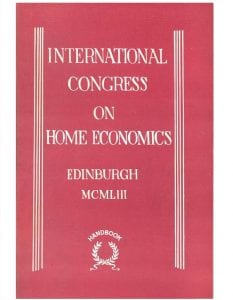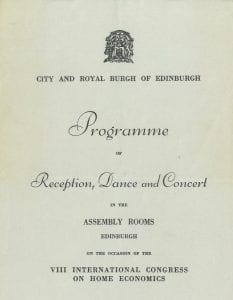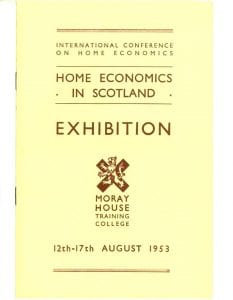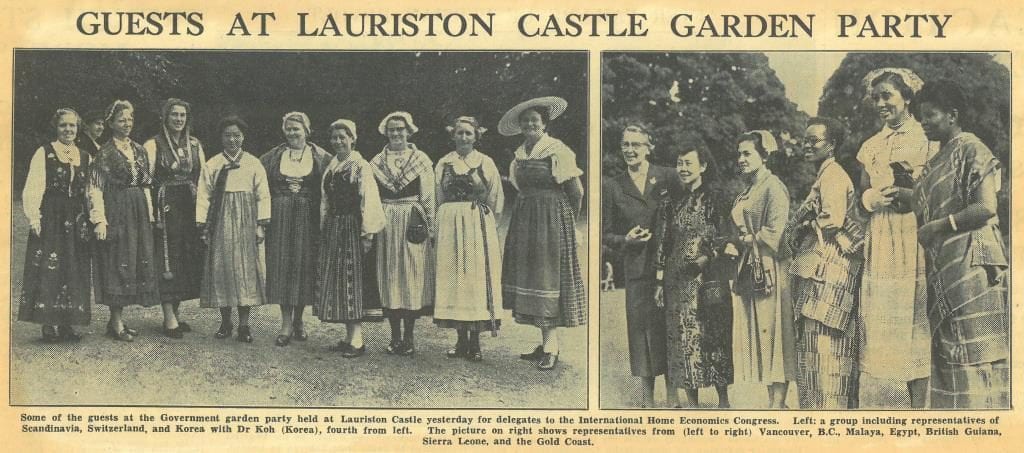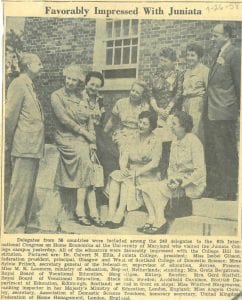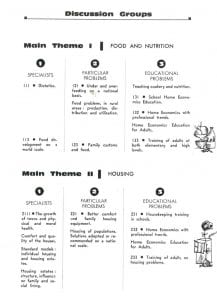A Wellcome Trust Research Resources Project
The 1st International Congress on Home Economics was held in Fribourg, Switzerland, in October 1908. It was attended by 750 delegates, representing 20 countries, who had all come together to share knowledge and experience in the field of Home Economics, and look at the development and promotion of training for its teachers. It was very successful in enabling the exchange of ideas between nations and led to the International Federation for Home Economics (IFHE) being founded during the Congress.
Subsequent International Congresses were held every four, or more, years and each one had a different theme. Like many conferences today, the programme consisted of plenary sessions, with talks on different aspects around the theme, and sectional meetings, enabling delegates interested in particular areas of work to get together. In the sectional meetings issues raised by the plenary sessions were discussed and at each Congress delegates agreed on a number of resolutions, the policies and strategies to follow when they returned to their workplace. At the 1st International Congress 32 resolutions were agreed, including guidelines for the training of Home Economics teachers to ensure that scientific pedagogy was embedded into the courses, and for the service of home economics in public health including, reducing alcoholism, tuberculosis and infant mortality. The Congress was an important channel for international collaboration on the development of Home Economics but it also provided the opportunity for delegates to learn about cultures, particularly that of the host country.
In 1953 the 8th International Congress was hosted in Edinburgh from 12-18 August. It was the first time the Congress had been held in Britain and the 1250 delegates attending from 55 countries were given an extensive flavour of Scotland. The “Grand Tour”, as the handbook called it, was as ‘a trip doon the watter’ by steamship, from Glasgow down the Clyde Estuary. There was a vast range of other optional excursions offered, such as tours of country estates, businesses, public services and, of course, the Glasgow and Edinburgh Colleges of Domestic Science. Edinburgh residents also opened up their homes for small parties of overseas delegates for a sherry or Sunday tea. A civic reception with ceilidh dancing was held and delegates were invited to attend a Garden Party at Laurieston Castle and come wearing “national dress (with hats)”. It is a wonder that with so many excursions and visits that any ‘business’ got done but there were 3 plenary sessions and 4 sectional meetings fitted into the programme. The theme was “Home economics at the service of life: its contribution to individual and social progress” and looked at the training of home economics teachers in different countries, practical methods in teaching home economics, help for housewives, home economics courses and careers.
Although the International Congress never returned to Scotland, a strong Scottish influence was brought to bear on the IFHE when Isobel Gibson, Principal of the Glasgow and West of Scotland College of Domestic Science (GWSCDS), became its acting President in 1958, and then elected President from 1959 to 1963. Not only did this raise Isobel Gibson’s profile internationally but also that of the GWSCDS. At the 9th International Congress, in Maryland, United States, in 1958, Isobel Gibson delivered the presidential address and spoke about issues which had been key in the establishment of the GWSCDS and its predecessor institutions, namely industrialisation and the impact of uncontrolled rapid expansion of towns on conditions in homes and public health. She suggested that by sharing of history and experiences, some of the mistakes made by the older industrial countries could be avoided.
Isobel Gibson maintained her association with IFHE after she retired from the College, presiding over the 10th International Congress, in Paris, in 1963. She gained a standing ovation for her presidential address in which she talked emphatically of the benefits of international sharing in order to compare different approaches to education and re-assess educational systems. Having lived through the two World Wars, she was conscious of other benefits of international collaboration and stated:
“The more we know of each other, the more that we work together to help each other the more likely is it that nation will speak peace unto nation.”
- Isobel Gibson and delegates, 9th Congress, Maryland 1958
- Programme, 10th Congress, Paris 1963
Isobel Gibson was a forward thinker and stressed the need for Home Economics teaching to be kept current in order to deal with changes in society, including advances in technology, increased mechanisation, and stresses brought on by the rapid changes. She also recognised the impact of changes in the roles of men and women, with the need for married women to have jobs outside the home. She said:
“Women should be equal partners, not only in the home but in the community upon which the home is so dependent”
Today the IFHE continues to promote and support the role of Home Economics in helping to overcome societal problems and create healthy, sustainable communities. It has a number of working committees and is represented at the United Nations (including United Nations Economic and Social Council (ECOSOC), Food and Agriculture Organisation (FAO), United Nations International Children’s Emergency Fund (UNICEF) and United Nations Educational, Scientific and Cultural Organisation (UNESCO). In 2020 it will celebrate its 24th World Congress in Atlanta, Georgia, USA.
Kirsty Menzies
Wellcome Trust funded Project Archivist
References
International Federation for Home Economics website https://www.ifhe.org
International Congress on Home Economics, 1953-1963, QC Collection
